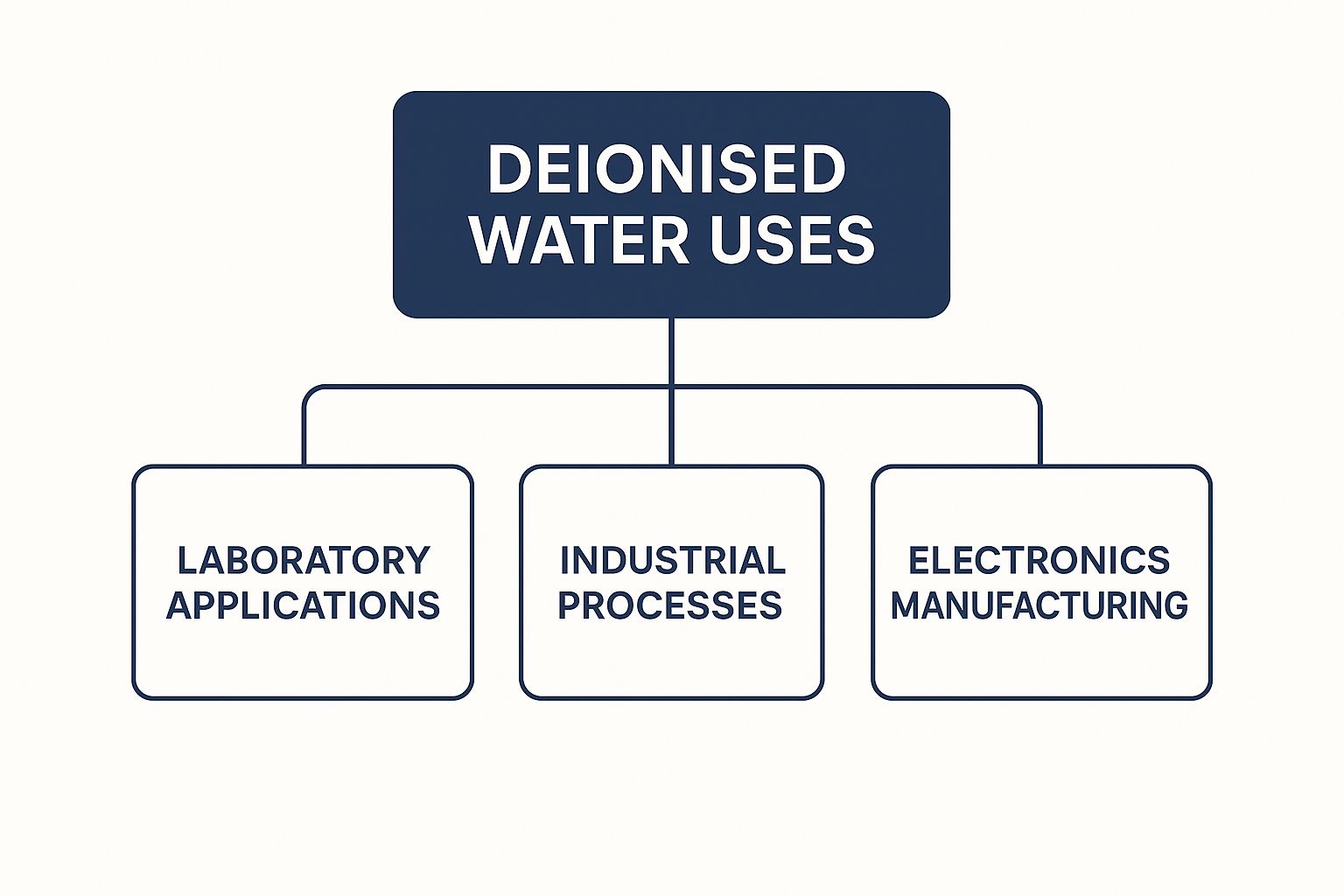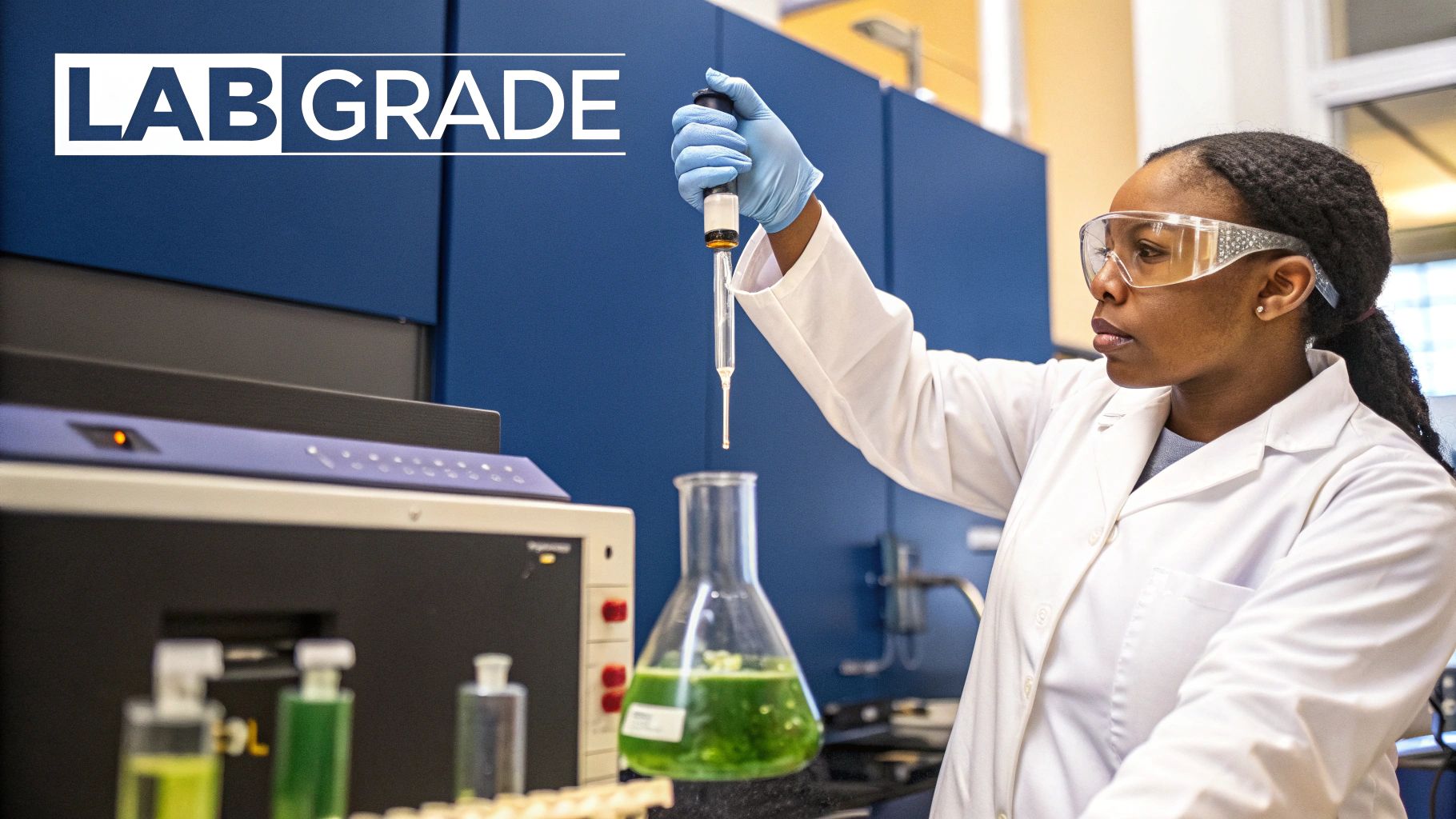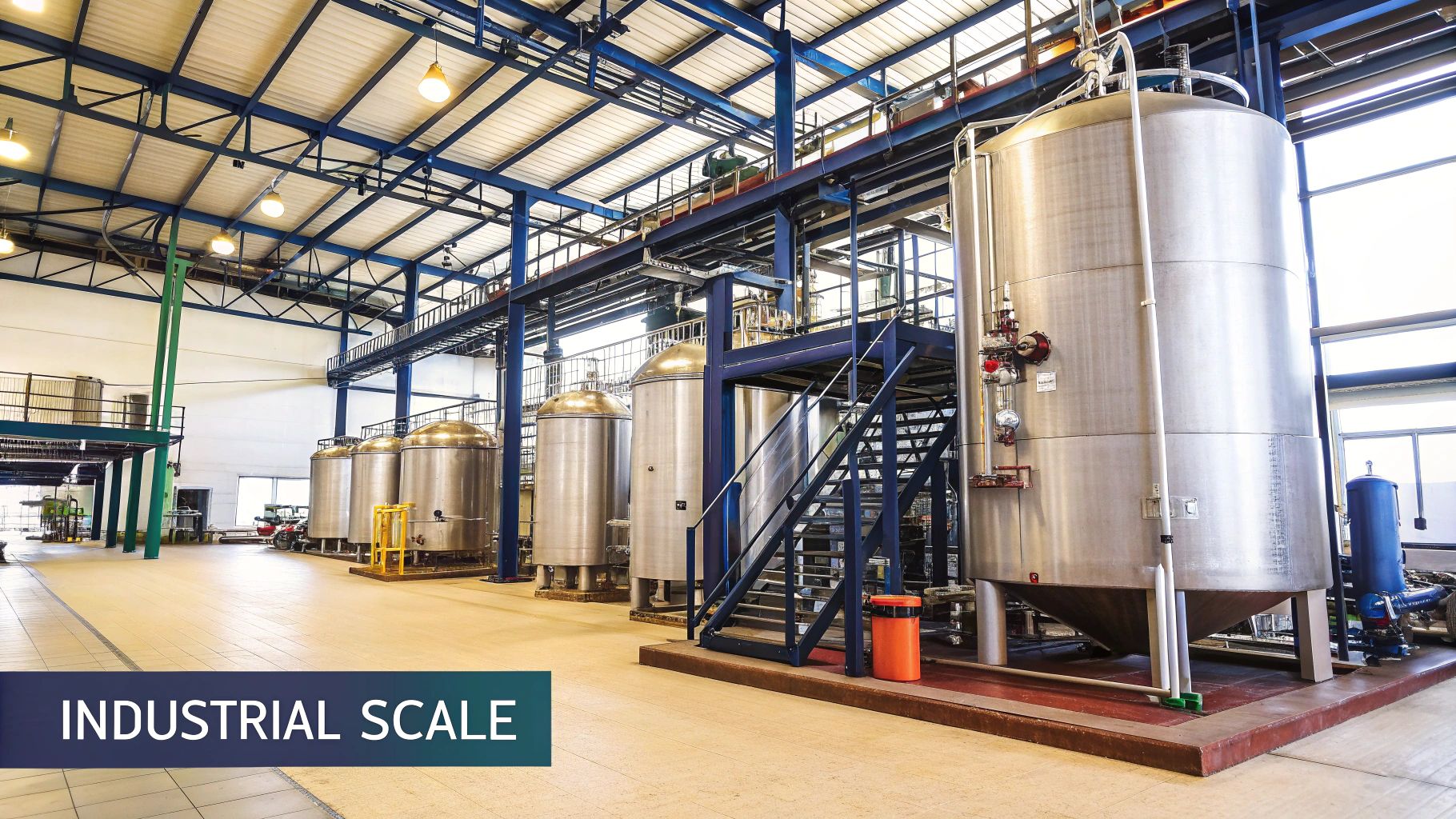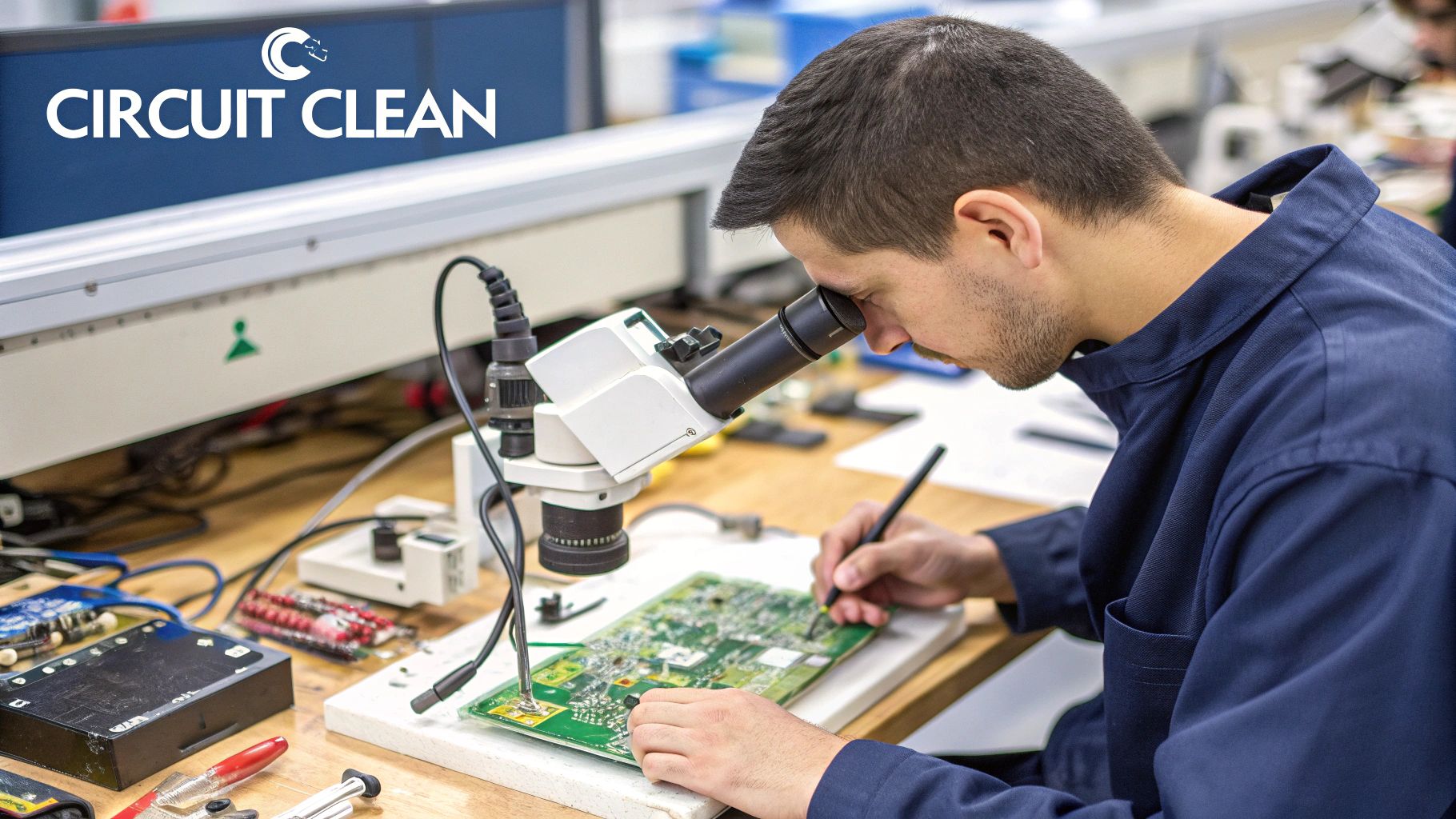Deionised water is a bit of an unsung hero in countless labs, factories, and even car detailing shops. It’s called for whenever the mineral impurities in regular tap water would cause a problem, which is more often than you might think. Its main job is to prevent mineral deposits and unwanted chemical reactions, making it vital for everything from delicate scientific experiments to getting that perfect spot-free car wash.
Understanding Deionised Water and Its Purpose
Before we jump into all its different uses, let's get a clear picture of what deionised water actually is. Imagine water being passed through a highly specialised filter, one that acts like a powerful magnet for mineral ions. It pulls out things like calcium, sodium, and chloride.
This process, known as ion exchange, effectively strips the water of its electrical charge. The result is water that's exceptionally pure from a mineral perspective. It’s precisely this lack of ions that makes it so valuable for jobs where mineral build-up or electrical conductivity would be a real disaster.
Key Properties and Core Benefits
What makes deionised water so useful? It's simple, really. Having virtually no mineral ions means it won't contaminate sensitive lab tests or cause damaging scale build-up in expensive industrial machinery. This single property is why it has become the go-to choice for so many industries across the UK.
The real power of deionised water lies not in what it contains, but in what it's missing. By stripping out those mineral ions, it becomes a stable, predictable, and non-reactive liquid—perfect for any application where impurities could ruin the final result.
This image highlights the main areas where you'll find deionised water being used every day.

As you can see, its uses range from highly technical fields like electronics manufacturing all the way to more common industrial and laboratory tasks.
Deionised Water at a Glance
To quickly summarise, here are the key characteristics of deionised water that make it so indispensable for specialised work.
| Property | Description | Why It Matters |
|---|---|---|
| Mineral-Free | Essentially all dissolved mineral ions (salts) like calcium, magnesium, and sodium have been removed. | Prevents limescale build-up in machinery and residue on surfaces, ensuring a clean finish. |
| Low Electrical Conductivity | The absence of ions means it's a poor conductor of electricity. | Crucial for electronics manufacturing and in cooling systems where conductivity could cause short circuits. |
| High Purity | It's free from charged impurities that could interfere with chemical processes. | Ensures consistency and reliability in scientific experiments, pharmaceutical production, and cosmetics. |
| Reactive Nature | Because it's "empty," deionised water actively seeks to bond with minerals and contaminants. | Makes it an excellent cleaning agent for rinsing away impurities without leaving any of its own behind. |
These properties combined explain why deionised water isn't just "clean water"—it's a highly engineered liquid designed for specific, demanding jobs.
How Does It Differ From Distilled Water?
It’s a common mix-up, but deionised and distilled water are not the same thing. Their production methods are completely different. Deionisation specifically targets and removes charged ions. Distillation, on the other hand, involves boiling water and collecting the condensed steam, a process that removes a much broader spectrum of contaminants.
While both are incredibly pure, the specific purification method makes each one better suited for different tasks. To explore this further, you can find out more about the nuances of different pure water types in our guide: https://24purewater.co.uk/ultrapure-water-the-purest-water-is-not-your-drinking-water/.
Critical Roles in Laboratories and Pharmaceuticals
In high-stakes environments like laboratories and pharmaceutical manufacturing, there's simply no room for error. Precision isn't just a goal; it's the absolute standard. This is where deionised water becomes an indispensable tool, as even the tiniest, invisible impurity can throw off an entire experiment or compromise a medical product.
Its exceptional purity is the key to ensuring scientific results are reliable and, most importantly, that medical products are safe for patients.

Think about preparing chemical solutions in a UK lab. If you used regular tap water, all the extra mineral ions would interfere with the delicate chemical reactions, leading to skewed measurements and failed experiments. Deionised water acts as a completely neutral, clean slate, guaranteeing that the results are not only accurate but also repeatable.
Ensuring Purity in Pharmaceutical Production
When we step into the world of pharmaceuticals, the importance of pure water is magnified tenfold. Here, any contaminant isn’t just an inconvenience; it could directly threaten a patient's health. Ionic impurities have the potential to alter a drug's stability, weaken its effectiveness, or even trigger harmful side effects.
In the UK's pharmaceutical industry, a sector worth over £50 billion annually, deionised water isn't just a preference—it's a cornerstone of production. It's used in everything from sterile intravenous solutions to critical procedures like dialysis, where water purity is directly linked to patient well-being.
This non-negotiable level of purity is vital for several key tasks:
- Manufacturing Medicines: It often acts as a solvent or a core ingredient in liquid medicines, ensuring the final product is completely free from unwanted contaminants.
- Sterilising Equipment: Deionised water is perfect for rinsing and sterilising lab glassware and manufacturing equipment. It leaves no mineral residue behind, preventing cross-contamination between batches.
- Formulation Processes: It's essential for creating stable emulsions and suspensions, which is crucial for guaranteeing product consistency and a predictable shelf life.
The Connection Between Water Purity and Patient Safety
Beyond the factory floor, deionised water plays a direct role in patient care, especially in treatments like dialysis. During dialysis, a patient's blood is filtered outside their body, making the purity of the water used in the dialysate solution absolutely critical.
Any contaminants in that water could pass straight into the bloodstream, leading to severe health complications. That's why using highly purified deionised water is a life-saving standard in healthcare facilities across the country. Its role also extends to general cleanliness; it's vital for sterilisation and for maintaining hygiene in medical practices, ensuring a safe environment for both patients and staff.
Essential Uses in Manufacturing and Industry
Step outside the lab, and you'll find deionised water is the unsung hero across the UK's industrial landscape. Its purity makes it an indispensable tool for protecting expensive equipment, guaranteeing quality control, and keeping operations running smoothly everywhere from electronics factories to power stations.

Nowhere is this more critical than in electronics manufacturing. Trying to clean a delicate circuit board with tap water is a recipe for disaster. Why? Because the dissolved minerals make it electrically conductive, which can easily short-circuit and destroy sensitive components. Deionised water, being a very poor electrical conductor, safely rinses away contaminants without any risk, dramatically improving production success rates.
Preventing Damage and Improving Efficiency
The stakes are just as high in heavy industry and power generation. Think about what happens when you use regular tap water in an industrial boiler or cooling tower—it’s just like limescale building up in your kettle at home, but on a massive scale. This mineral scale clogs up pipes, seriously reduces heat transfer, and can eventually lead to catastrophic equipment failure.
Deionised water completely prevents this costly build-up. It safeguards multi-million-pound machinery and ensures the entire system runs at peak efficiency, extending the life of crucial infrastructure while cutting down on maintenance.
This need for purity echoes across countless other sectors. The applications are surprisingly diverse, showing just how versatile this water really is. You can learn more about the important industries that use ultrapure water in our detailed guide.
Ensuring Consistency in Consumer Products
You can also see its impact in the everyday products we use, where consistency is everything.
- Cosmetics: For lotions, shampoos, and creams, deionised water acts as a perfectly pure and stable base. This guarantees that the product’s texture, pH, and overall performance are identical in every single batch, without any unpredictable reactions from unwanted minerals.
- Food and Beverages: It's used to clean and rinse equipment to meet the highest hygiene standards, leaving absolutely no residue behind. It's also central to specific production techniques, like the water-based decaffeination methods like the Swiss Water Process for coffee, where water purity directly affects the final flavour.
Improving Automotive Care and Maintenance
When you're working in the garage or on the driveway, deionised water is one of the most useful things you can have on hand. It helps protect critical components and is the key to getting that flawless, showroom finish. It might seem harmless to use regular tap water in your car's systems, but those dissolved minerals can cause some serious headaches down the line.
Think of deionised water as a clean slate for your car's cooling system. Tap water is full of minerals like calcium and magnesium, which inevitably lead to limescale and corrosion. This nasty build-up can clog radiators, make your cooling system less effective, and ultimately shorten the life of crucial engine parts. Because it's free from these minerals, deionised water gets the job done without leaving any damaging deposits behind. It's also what the pros use for topping up lead-acid batteries, where mineral gunk can mess with performance and lifespan.

Achieving a Perfect, Spot-Free Finish
Beyond the engine bay, deionised water is the secret weapon for a perfect, streak-free car wash. You know those frustrating white spots that appear after you've washed your car? That’s just the mineral residue left behind as tap water evaporates.
Since deionised water contains no dissolved minerals, it evaporates completely cleanly. This means no spots, no streaks, and no need to furiously towel-dry your vehicle to avoid watermarks. It’s an absolute must for professional detailers and car enthusiasts alike.
For anyone chasing that impeccable shine, understanding how pure water works is a game-changer. You can find more in-depth advice on using deionised water for car cleaning to get professional-quality results every single time. It's a simple switch that makes a huge difference, protecting your paintwork and leaving an incredible finish without all the extra work.
Practical Applications Around the Home
The benefits of pure water aren't just for labs and factories; they extend right into our own homes. Many everyday items can last longer and work better simply by switching out tap water for its deionised counterpart.
Think about your steam iron, clothes steamer, or humidifier. Ever noticed that chalky white build-up? That’s limescale, and it’s caused by the minerals in your tap water. Over time, it clogs nozzles and ruins sensitive heating elements. Using deionised water stops this problem in its tracks, protecting your appliances from damage and keeping them running smoothly for years.
For Hobbyists and Home Care
The advantages are just as significant for hobbies and specialised tasks around the house. A simple change in water can make all the difference in getting better results and protecting your prized possessions.
- Aquariums: Keeping sensitive fish means creating a stable environment. Deionised water provides a perfect blank canvas, letting you add the precise mineral blends your fish need without worrying about the unknown chemicals lurking in tap water.
- Delicate Houseplants: Orchids and other sensitive plants can suffer from the chlorine and minerals found in tap water. Watering them with deionised water gives them pure hydration, preventing mineral burn on their delicate roots.
- Spotless Cleaning: For a truly streak-free shine on windows, mirrors, or glass, nothing beats deionised water. This is the secret professional window cleaners use, often with tools like a water-fed pole window cleaning system.
The magic lies in its purity. Because deionised water has no dissolved minerals, it evaporates without leaving a single spot or residue behind. This simple property is the key to a flawless finish on any reflective surface.
This is exactly why you can often find deionised water on the shelves of car supply shops and DIY stores. It’s a handy, effective solution for countless domestic tasks.
Common Questions About Deionised Water
Even after getting to grips with what deionised water is and where it’s used, a few practical questions almost always pop up. Let's tackle some of the most common ones so you can use it with confidence.
Is It Safe to Drink Deionised Water?
In a word, no. While a small sip isn't toxic, making a habit of drinking deionised water is a bad idea.
The process that makes it so pure also strips out essential minerals like calcium and magnesium, which our bodies need to function properly. Most people find it has a noticeably flat, unappealing taste for this very reason. Over the long term, its purity means it can even start to pull trace minerals from your body. For staying hydrated, stick with regular tap or bottled water—it's much healthier.
How Is Deionised Water Different from Distilled Water?
This is a great question. Both are types of highly purified water, but they get there in completely different ways, and the right choice really boils down to the job at hand.
- Deionised Water: Think of this as a magnetic filtering process. Water is passed through special resins that attract and trap mineral ions (the charged particles), leaving pure H₂O behind.
- Distilled Water: This is all about evaporation. Water is boiled into steam, leaving almost all contaminants behind—minerals, microorganisms, you name it. The pure steam is then cooled back down into liquid water.
So, while distillation technically produces a purer end product, deionisation is often the quicker and more economical choice when you just need to get rid of dissolved minerals.
Can I Make Deionised Water at Home?
While it’s theoretically possible, making true deionised water at home just isn't practical for most people. It requires specialised ion-exchange columns and equipment that are expensive and a hassle to maintain.
For everyday tasks like filling a steam iron, topping up a car battery, or getting a streak-free finish on your windows, it's far easier and cheaper to just buy it ready-made. You'll find it in most supermarkets, DIY centres, and car accessory shops.
If you've got more questions, we've probably answered them in our comprehensive deionised water FAQs.
For professionals and enthusiasts needing a reliable, on-demand supply of ultra-pure water, 24 Pure Water offers a nationwide network of self-service filling stations. Get convenient, cost-effective deionised water 24/7. Find your nearest station and start today at https://24purewater.co.uk.
